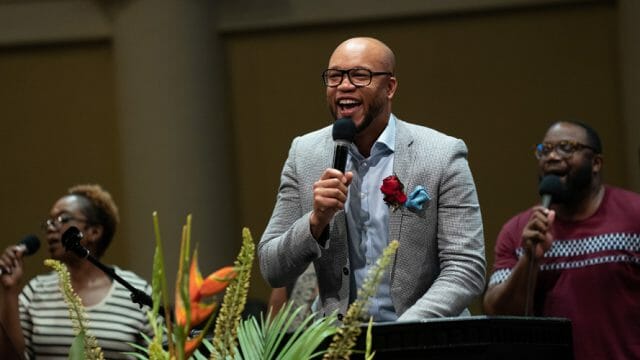Achieving success in the church.

Local churches, conferences, unions, divisions, the General Conference, and their institutions frequently need leadership for various positions. Retirements, resignations, transitions, and sometimes deaths create a revolving door in leadership offices. How does an organization find the right” leader for the times? Is there only one? How can such a person be recruited and retained? What is the nature of leadership in Seventh-day Adventist Church infrastructure?
Because leadership roles are so important in church and institutional life, recruitment, selection, performance, and accountability processes deserve careful consideration. There may even be ways to improve upon time-honored practices.
Identification and selection of leadership is not the only concern when it comes to leadership in an organization. There are other dimensions in the overall framework of leadership dealing with continued training, performance evaluation, workplace culture, and mentoring. An organization must look beyond the leadership selection process and adopt systems and strategies that contribute to leadership success and perpetuity of the entity.
The Nature of Leadership in the Church
The church exists in societies with differing paradigms for leadership in government, in commerce, and in the military. Yet none of these offers a model of leadership structure and performance for the faith community. The Seventh-day Adventist Church has adopted a team approach to leadership with ultimate authority in a group rather than in an individual. Furthermore, the mentality of Christian leadership is service rather than control. “Leadership is not so much the exercise of power itself as the empowerment of others.”1
The human tendency is to exercise power and authority, at least to some degree, in the interest of self—the desire to be first, to climb the ladder of success, to put down others, to be regarded as powerful, to reap prestige and praise. Christlike leadership is exercising power and authority for the good of others. The words of Jesus form the basis for Christian leadership: “I am among you as the One who serves” (Luke 22:27).
The church, like all volunteer organizations, responds to authority differently than that found in rigidly hierarchical structures. “Because leadership is necessarily an exercise of authority, it easily shifts into an exercise of power. But the minute it does that, it begins to inflict damage on both the leader and the led.”2
Those “whom the Lord calls to important positions in His work are to cultivate a humble dependence upon Him. They are not to seek to embrace too much authority; for God has not called them to a work of ruling, but to plan and counsel with their fellow laborers.”3
Christian leaders do not abandon the use of authority but exert their power under the constraint of sacrificially living for the good of others. It is a leader’s ability to forget self that is often the mark of distinction. “God never designed that one man’s mind and judgment should be a controlling power.
He never designed that one man should rule and plan and devise without the careful and prayerful consideration of the whole body, in order that all may move in a sound, thorough, harmonious manner.”4
The Leadership Selection Process
Most leaders who serve in elected roles are chosen through a nomination process resulting in a recommendation to delegates voting in a membership meeting. In many cases the Nominating Committee is expected to fulfill, within a few hours, its duty of recommending names for a wide variety of leadership roles. This is a daunting task, and, in the interest of time efficiency, some aspects of effectiveness may be compromised.
Several organizations have adopted bylaw provisions permitting the formation and functioning of the Nominating Committee well in advance of a constituency session. These arrangements offer a more deliberative environment for recommendations on executive leadership.
Furthermore, if a new executive leader is recommended for election, they have more time to consider the possible selection of team members. Having more time for Nominating Committee and nominated executives to reflect, research, and evaluate is important, because human judgments of people tend to be rather superficial. The prophet Samuel, when faced with such circumstances, learned that “man looks at the outward appearance, but the Lord looks at the heart” (1 Sam. 16:7).
Sufficient time for a review of potential leadership candidates is also important to permit exploration of a wider spectrum of possibilities. Under time constraints a Nominating Committee can revert to a pattern of focusing on a narrow age range and a limited pool of candidates. Insufficient attention on these matters may overlook the contributions of youth, seniors, minorities, or gifted persons who have not been in the mainstream of public attention.
In the annals of divine history God has often chosen unlikely leaders through whom His power is displayed. Ellen White draws attention to more than social roles, academic attainment, and experiential qualifications through the reminder that “it is the accompaniment of the Holy Spirit of God that prepares workers, both men and women, to become pastors to the flock of God.”5
Institutions have sometimes used executive search organizations to assist in the search process. These organizations employ a systematic process in the selection
of potential leadership candidates. It is important that individuals or groups conducting a leadership search begin with an up-to-date job description.
Potential candidates’ résumés will be evaluated in view of what the job requires. As the search process begins to focus on a short list of individuals, it is imperative to interview each candidate and explore references provided as well as any information from previous employers.
Leadership life is primarily relational. One’s qualifications for leadership may depend on knowledge and expertise in specific fields. In addition to the technical, academic, and practical know-how that a person brings to the job, there is urgent need for interpersonal skills. Search committees can too readily focus on professional qualifications and overlook the importance of the relational components of organizational life—trustworthiness, communication and listening habits, teamwork mentality, respect for colleagues, and thoughtfulness about the long-range impact of decisions and actions.
Unless the job description specifies eligibility prerequisites, nominating or search committees may be required by entity bylaws to include male and female candidates as well as representatives of minorities in their search process. Doing so, whether or not required, reflects the official Seventh-day Adventist philosophy on the family of God as multiracial, multiethnic, and gender-inclusive.6 Current church policy recognizes one exception by reserving ordination to the gospel ministry for males only.
Leadership Success
The governing body ’s role in leadership success is as important as its role in leadership selection. Individuals elected or appointed for the first time must not be left to figure out for themselves what the responsibility involves or how it should be accomplished. In the local church the pastor and board members should ensure that persons entering new assignments receive appropriate training and orientation for their new responsibilities.
Elsewhere in organizational structure, the executive committee or board should ensure that there is adequate orientation for new leaders along with opportunity for ongoing education related to the responsibilities borne. Various leadership training initiatives have arisen in divisions and at the General Conference. There is still room for progress in systematizing leadership training and orientation throughout church and institutional infrastructure.
Another way that governing bodies can support and facilitate leadership success is through periodic leadership evaluations. When done constructively and in the interest of supporting and developing leaders, an evaluation reveals both strengths and opportunities for growth. Leader evaluation tools abound or can be created as needed. A 360-degree evaluation gives opportunity for colleagues, supervisors, and those supervised to reflect on the performance of the leader and yield multidimensional perspectives on a person’s performance.
The Leadership Legacy
A top leadership priority is to think about what a person leaves behind when he/she quits the job or retires. Leadership is not just about what can be done today. It is also about preparing people and the organization for the future.
The responsibilities one carries today will shift to the shoulders of another tomorrow. Every leader, whether an administrator or not, needs to be intentional about passing the torch to a succeeding generation. This involves equipping people with skills, engaging their creativity and commitment, enabling them to comprehend and embrace the mission of the organization, and teaching them the art of leadership. One of the priorities for leadership is to build the pool of candidates for leadership in the future.
The life of Barnabas, seen through brief glimpses recorded in the book of Acts, is a powerful example of a leader who left a legacy of building people. Barnabas was instrumental in the life and leadership of the apostle Paul. When the disciples were wary about accepting the now-converted Paul, Barnabas took great personal risk to encourage Paul and to convince the disciples of Paul’s authentic spiritual experience.
In Antioch, a place where a church was planted without official sanction by and involvement of the “accepted” leaders, Barnabas saw the grace of God rather than the weaknesses and mistakes of this fledgling congregation. Remaining in Antioch, seeing the needs there and perhaps recognizing his own limitations, Barnabas called for Paul to come and join him in the work. Barnabas recognized talent and ability and was big enough to bring other gifted people into leadership.
Though partners in mission for some time, Paul and Barnabas eventually separated over a disagreement on the presence of young John Mark. Barnabas served as a mentor for John Mark, and eventually Paul himself recognized John Mark as a valuable companion.
Governance and Leadership
Leadership in church entities is not only the responsibility of individuals in elected office. The governing body (executive committee or board) itself has a crucial leadership role. In Seventh-day Adventist organizational structure, the most important decisions are made by a group—the church board, executive committees of conferences, unions, divisions, the General Conference, and, in the case of institutions, the board of trustees. Every individual leader is accountable to a group. The highest authority granted to any entity of organization is always a group rather than an individual. Ultimately, from a leadership standpoint, the success of the organization is dependent on the governing body.
The challenge here is that effective group decisions do not arise spontaneously. They require deliberate designs in structure and social dynamics. Therefore, appropriate training for executive committees and board members is essential to ensure effective and efficient governance. Members of the governing body ought to have training as to what they should know about the organization, what they should have in order to participate in responsible decision-making, and what they should do to fulfill governance responsibilities effectively and efficiently.
Conclusion
Every organization needs leadership. The Seventh-day Adventist Church encompasses ecclesiastical and institutional structures around the world—all having multiple leadership roles. Each entity in denominational structure is engaged in a long-term mission that outlives its present generation of leaders. Therefore, every organizational unit needs to give careful thought to the processes by which leaders are chosen, the nature of Christlike leadership, the systems through which leadership is nurtured, and the strategies that provide a continuing supply of new leaders for changing and challenging times ahead. May God grant wisdom to address the nature, status, and performance of leadership in every church entity.
1 Warren Bennis and Burt Nanus, Leaders: The Strategies for Taking Charge (New York: Harper & Row, 1985), p. 80.
2 Eugene Peterson, Introduction to 2 Corinthians, The Message: The New Testament, Psalms and Proverbs (NavPress, 1996).
3 Ellen G. White, Testimonies for the Church (Mountain View, Calif.: Pacific Press Pub. Assn., 1948), vol. 9, p. 270.
4 Ellen G. White, Selected Messages (Washington, D.C.: Review and Herald Pub. Assn., 1958, 1980), book 3, pp. 16, 17.
5 E. G White, Testimonies, vol. 6, p. 322.
6 General Conference Working Policy, BA 60, Human Relations, and BA 60 10, Official Position.








